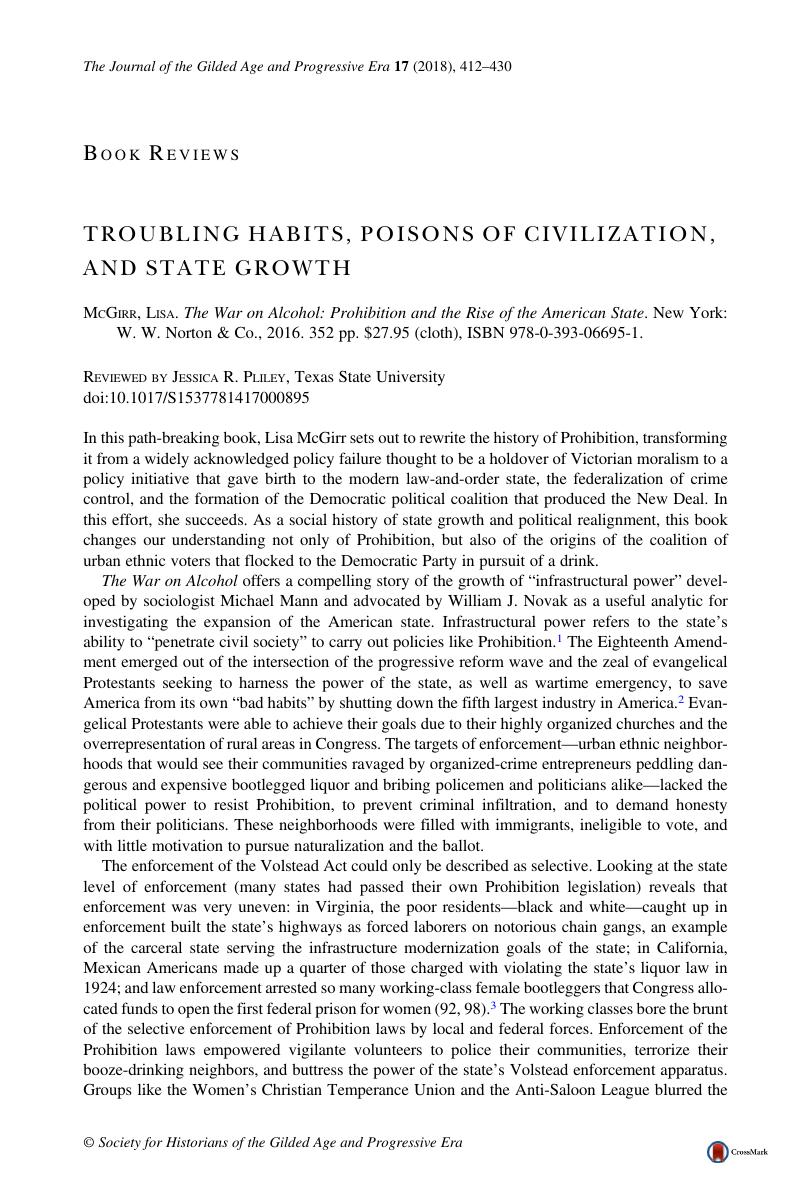No CrossRef data available.
Article contents
TROUBLING HABITS, POISONS OF CIVILIZATION, AND STATE GROWTH - Lisa McGirr. The War on Alcohol: Prohibition and the Rise of the American State. New York: W. W. Norton & Co., 2016. 352 pp. $27.95 (cloth), ISBN 978-0-393-06695-1.
Published online by Cambridge University Press: 27 April 2018
Abstract

- Type
- Book Reviews
- Information
- The Journal of the Gilded Age and Progressive Era , Volume 17 , Issue 2 , April 2018 , pp. 412 - 415
- Copyright
- Copyright © Society for Historians of the Gilded Age and Progressive Era 2018
References
NOTES
1 Novak, William J., “The Myth of the ‘Weak’ American State,” American Historical Review 113:3 (2008): 752–72CrossRefGoogle Scholar, 763.
2 Burnham, John C., Bad Habits: Drinking, Smoking, Taking Drugs, Gambling, Sexual Misbehavior and Swearing in American History (New York: New York University Press, 1999), 5Google Scholar; Okrent, Daniel, Last Call: The Rise and Fall of Prohibition (New York: Scribner, 2010), 3Google Scholar.
3 States were, and are, the greatest beneficiaries of forced labor in prisons. Genevieve LeBaron, Prison Labor, Capitalism & the American State (Urbana: University of Illinois Press, forthcoming).
4 Novak, “The Myth of the ‘Weak’ American State,” 766.
5 Ibid., 756. I make a similar point in Policing Sexuality: The Mann Act and the Making of the FBI (Cambridge, MA: Harvard University Press, 2014), 84–105Google Scholar. See also Fox, Cybelle, Three Worlds of Relief: Race, Immigration, and the American Welfare State from the Progressive Era to the New Deal (Princeton, NJ: Princeton University Press, 2012)Google Scholar.
6 Okrent, Last Call, 30, 54.
7 Ibid., 98.
8 Ibid., 299.
9 Ibid., 362.
10 Courtwright, David T., Forces of Habit: Drugs and the Making of the Modern World (Cambridge, MA: Harvard University Press, 2001), 156Google Scholar. For “tax addition,” see 155.
11 Ibid., 165.
12 Chauncey, George, Gay New York: Gender, Urban Culture and the Making of the Gay Male World, 1890–1940 (New York: Basic Books, 1994), 331–54Google Scholar.
13 Canaday, Margot, The Straight State: Sexuality and Citizenship in Twentieth-Century America (Princeton, NJ: Princeton University Press, 2009)Google Scholar; Stewart-Winter, Timothy, Queer Clout: Chicago and the Rise of Gay Politics (Philadelphia: University of Pennsylvania Press, 2016), 50–51Google Scholar, 78–81, 113–15; Fine, Sydney, Violence in the Model City: The Cavanagh Administration, Race Relations, and the Detroit Riot of 1967 (East Lansing: Michigan State University Press, 2007), 155Google Scholar; Muhammad, Khalil Gibran, The Condemnation of Blackness: Race, Crime, and the Making of Modern Urban America (Cambridge, MA: Harvard University Press, 2010)Google Scholar.
14 Self, Robert O., All in the Family: The Realignment of American Democracy since the 1960s (New York: Hill and Wang, 2012)Google Scholar.
15 Burnham, Bad Habits, 5. Foster, Gaines M., Moral Reconstruction: Christian Lobbyists and the Federal Legislation of Morality, 1865–1920 (Chapel Hill: University of North Carolina Press, 2002)Google Scholar.


